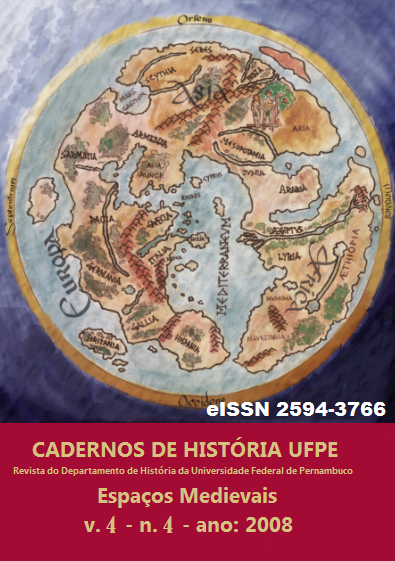O APOCALIPSE BERGMANIANO
Palavras-chave:
O Sétimo Selo, Baixa Idade Média, Livro do Apocalipse, The Seventh Seal, Late Middle Ages, The Book of ApocalypseResumo
Resumo
Sob o olhar das manifestações artísticas e culturais da Idade Média Ocidental, o texto a seguir visa a analisar a obra cinematográfica intitulada O Sétimo Selo (1957), dirigida pelo cineasta sueco Ingmar Bergman (1918-2007). Este filme consiste, pois, numa importante fonte para a compreensão da chamada crise do medievo na Baixa Idade média (séculos XIV e XV): as Cruzadas, a fome, a Inquisição, a morte e a Peste Negra. A análise proposta se compõe, portanto, de três partes principais. Em primeiro lugar, após uma breve biografia de Ingmar Bergman e algumas informações sobre o filme, serão enfatizadas as referências, feitas ao longo da obra, a passagens do Livro do Apocalipse, à música Dies Irae e à Dança da Morte. Além disto, serão igualmente observadas as influências exercidas sobre o cineasta por Carmina Burana e pelas igrejas da sua cidade natal, Uppsala. Em seguida, será proposto um estudo mais aprofundado do Livro do Apocalipse e de algumas de suas passagens com o intuito de expor as leituras que se fazia delas na época. A partir disto, será realizada uma interpretação sobre a maneira como essas mesmas leituras contribuíam para suscitar nas mentes dos indivíduos a idéia de um fim próximo e inevitável. Por fim, conclui-se com uma indagação, a partir do mesmo texto bíblico, sobre a origem do medo da morte que permeava o imaginário medieval. Acredita-se que esse medo se devesse sobretudo a concepção imaginária de um Deus Pai, severo e dominador, cuja representação estava intimamente associada aos conceitos de sanção e de imprevisibilidade.
Palavras-chave: O Sétimo Selo, Baixa Idade Média, Livro do Apocalipse
Abstract
Among artistic and cultural manifestations about the Occidental Middle Ages, the present text aims at analysing The Seventh Seal (1957), film directed by the Swedish film director Ingmar Bergman (1918-2007). It is an important source to comprehend the so-called medieval crisis in the Late Middle Ages (XIVth and XVth centuries): the Crusades, the famine, the Inquisition, the death and the Black Plague. Therefore, the analysis proposed comprehends three main parts. At first, after a brief biography of Ingmar Bergman and some informations about the film, the references, done during the work, to The Book of Apocalypse passages, to Dies Irae song and to the Dance of Death are going to be emphasized. Moreover, in the same way, the influences exercised on the film director by Carmina Burana and by the churches from his native city, Upsala, are going to be observed. Afterwards, a deeper study about The Book of Apocalypse and some of its passages are going to be proposed in order to expose the readings that were done of that in those days. Based on that, an interpretation are going to be realised about the manner as that same readings contribute to generate on individual minds the idea of a near and inevitable ending. At last, the text are going to be concluded with an enquiry, based on the same biblical text, about the origin of the fear of the death that used to permeate the medieval imaginary. It’s believed that this fear were explained above all by the imaginary conception of a God the Father, severe and domineering, whose representation was intimately associated to the concepts of sanction and imprevisibility.
Keywords: The Seventh Seal, Late Middle Ages, The Book of Apocalypse
Downloads
Publicado
Edição
Seção
Licença
Autores que publicam nesta revista concordam com os seguintes termos:- Autores mantém os direitos autorais e concedem à revista o direito de primeira publicação, permitindo o compartilhamento do trabalho com reconhecimento da autoria do trabalho e publicação inicial nesta revista.
- Autores têm autorização para assumir contratos adicionais separadamente, para distribuição não-exclusiva da versão do trabalho publicada nesta revista (ex.: publicar em repositório institucional ou como capítulo de livro), com reconhecimento de autoria e publicação inicial nesta revista.
- Autores têm permissão a publicar e distribuir seu trabalho online (ex.: em repositórios institucionais ou na sua página pessoal) após o processo editorial.

